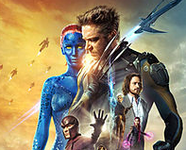X-Men director: 'The world is now sick of war'
The future is dark for the heroes of the X-Men saga in DAYS OF FUTURE PAST. A years-long world conflict between humans and mutants has taken its toll on their numbers, and now a scant few remain, including Professor Charles Xavier (Patrick Stewart), Erik "Magneto" Lehnsherr (Ian McKellen), Kitty Pryde (Ellen Page), and Wolverine (Hugh Jackman). Driven to near extinction by the technological terrors unleashed by Bolivar Trask (Peter Dinklage), the team forms a desperate plan: time travel.

Using Kitty Pryde's powers, Wolverine's consciousness will be sent back into his younger self in the 1970s, where he'll have to track down and help the First Class versions of the characters in order to stop Trask. But that will be even harder than it sounds, as in this era, the X-Men team is just as disparate, with Professor Xavier (James McAvoy) and the rest either at odds or in a low ebb. Can the younger versions of the mutants save their future?
Fortunately for the team, they have a big supporter in Bryan Singer, who returns to direct his first X-Men film since 2003's hugely successful X2. He's been involved as a producer and writer since then, but DAYS OF FUTURE PAST gives him a chance to combine both the original cast and their younger, First Class equivalents, while also introducing some new mutant faces. He talks old faces, new tricks and the fun - and headaches - of time travel...
What drew you to DAYS OF FUTURE PAST?
It happened over dinner, where Simon (Kinberg, writer/producer) said there was a desire on the part of him and Matthew Vaughn, who was going to direct, to explore a way to incorporate the two casts. And I said, "The only thing I can think of is time travel, and there's a precedent for it in the comic book." I started to talk about different ways we could do that with Simon. He took those ideas back to Matthew and they began the early development of the script. When Matthew left the project, I then began trying to figure out how to crack the time travel and what would be our conceit for it. It was once I figured that out that I felt, 'Okay, I'm ready to tell this story.' Time travel stories are their own genre; they're very specific. You have to create a set of rules, like how the past affects the future, and then you have to stick to them. Once I figured out the mechanism by which to do it, I warmed up to the notion very quickly. Plus, I very much wanted a chance to work with this new cast as a director because they only knew me as a producer and writer before. It also gave me a chance to work with my friends who were in the earlier pictures. It was a wonderful experience and everybody had a really great time, which was nice.
Also read: Ian McKellen, Erik Lehnsherr of X-Men: The films focus on people cast away by the society
It's your first X-Men film as a director since X2. What have you drawn from your work since then to re-energize you?
There are certain visual effects I wasn't able to do early on that now I can, so I could explore my imagination a little more. And the thing I loved doing a lot is parallel action - things happening simultaneously - so with this movie there was a great opportunity to be able to do that with events happening in the past and future at the same time. As a filmmaker, that's something I enjoy and wasn't able to do enough before. I think I did a lot of it in the climax of X2 and here I can really push that kind of cinema forward.
The Sentinels are a big part of the story. What were the challenges of creating them?
There are movies like TRANSFORMERS, IRON MAN, and PACIFIC RIM that have already explored robots of all different sizes and shapes and scope and calibre. I knew that I didn't want to make just another film where a robot attacks people, yet they are an element in the picture. They serve the story in an interesting way, and not necessarily in an obvious rock-em-sock-em battle robots way - although there is some of that too!
Were there big challenges with the time travel element?
It was a little challenging in the script development stage, but again, once I cracked the conceit and felt it made sense and Simon could write it, we could craft a story on a physical level, as well as an emotional one. I think what separates us from a lot of other comic book films is there's a huge thematic element in the X-Men universe about outcasts and trying to belong and what side you're on, and also an emotional aspect to it with the relationships of the characters. So once I started getting involved in that, it was great. I've always been fond of these characters and their relationships with one another, so a lot of things came easy.
Your X-Men movies have always have these deeper levels and layers, so is there something of that in DAYS OF FUTURE PAST?
It's the universal thing that people always think about - if I knew then what I know now, what choices would I have made? What kind of person would I be? Would I be the same person now? Do I have regrets? And what sacrifices would I be willing to make of myself to go back and change history?
And Trask is a new threat to our heroes, though his ideas come from a place of fear. Was he something you were excited to explore?
Yeah, I find Trask is a character that's kind of interesting - he's all about the future, about progress and development. His feeling is that although he can create profound weapons of destruction, he feels the cost of war is too great. And he understands that in science, the introduction of any new species that is more powerful or advanced than existing ones could eventually pose a threat of extinction. He feels that this is a moment in history for human beings to, for the first time, unite against what he considers a common struggle to survive.
Also read: The future is not a happy place for X-men
Xavier has a lot of focus this time. He has a journey...
Hugh goes on the physical journey, but it's Xavier who goes on the emotional one. He's reached a particular low; he's lost a great deal and it's basically a journey of redemption for himself and for his relationship with Raven.
How did you decide which of the new mutants would be in the film?
It was a diversity of powers. I didn't have a Nightcrawler this time, so I decided Blink would be this movie's version of that. I like Warpath as a character, there's a lot of heart in him, and Sunspot is really cool and stunning visually. And Bishop is a strong character, plus he has a weapon plugged into his body, which is something we haven't seen before.
How do you go about differentiating the tone of the different eras?
It would mostly be color. Obviously the '70s is brighter and more colorful, while the future is more monochromatic.
Were you conscious of trying to present a '70s that were realistic?
My notion with the X-Men universe is always to make it as realistic and believable as possible, so I tried to create a very real 1970s. If you look at any of the footage from that era, particularly from some of the events we recreated like the Paris peace conference after the Vietnam War, it's very realistic. I didn't want to go Austin Powers on the '70s.
Did you pick moments from the era you thought would be thematically right?
Absolutely. The X-Men story particularly is about war and its aftermath. The movie opens up with the tragic results of a world war in the future, and so to go back to the end of the Vietnam War was really powerful both visually and thematically. It sets the tone of a world that is now sick of war, has seen the unnecessary loss due to a very long conflict, and this informs a lot of Raven's character. When she first sided with Magneto at the end of First Class, she was becoming militant and on her way to becoming Mystique, but she hadn't quite gotten there yet. In DAYS OF FUTURE PAST, Magneto has been incarcerated for ten years. During that time, Raven has been investigating the disappearances and deaths of certain mutants and trying to find out who is responsible. She ultimately seeks revenge against that person, so she travels to Vietnam, experiences some of the war only to realize that she doesn't ever want to see that kind of war. She wants her vengeance, but not war. Magneto, however, comes from a very different place. So Raven is torn between Xavier, who wants an absolutely peaceful coexistence, and Magneto, who doesn't trust that humanity will ever allow that to happen, and the question is, which way will she go? It's a battle for the future, and also for her soul.
Is there going to be any connection to Apocalypse at the end of DOFP?
There might be. I'm not sure. There's an image that I'm toying with now that I may or may not at the end of the credits of Days.
Subscribe to Pravda.Ru Telegram channel, Facebook, RSS!




